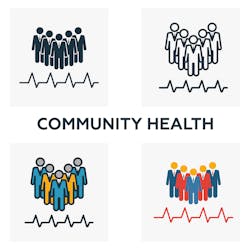Increasingly now, healthcare stakeholders are collaborating with community-based organizations and social service agencies in an effort to connect clinical care with just as important non-medical social determinants of health (SDOH) data.
In Pueblo, Col., for example, the non-profit hospital Parkview Medical Center is connecting with Catholic Charities Pueblo, an agency that serves over 12,000 individuals each year across 29 counties with the largest concentration of services offered in Pueblo County. As one of the main non-for-profit social service agencies in Southern Colorado, Catholic Charities operates 24 programs and services to address the needs of both children and their guardians. This multi-generational programming approach is representative of its goal of creating nurturing environments that support the full potential of children to prepare them for school and beyond, the organization’s officials say.
Catholic Charities of Pueblo and Parkview Medical Center had already been partners, working together on having the hospital send referrals to the social services agency. However, those referrals were delivered via telephone rather than using a more robust technology system. Now, by using a platform from artificial intelligence company Pieces, Inc. Catholic Charities of Pueblo will have its own instance of Pieces Connect, which will enable team members to not only send and receive referrals in the case management system but also to close the loop on those referrals.
"Our organization relies on referrals from members of our community network, like Parkview, to reach children and families in need," Lindsay Reeves, director of early childhood programs at Catholic Charities of Pueblo, said in the new collaboration announcement. "We're confident that Pieces Connect will enable us to enhance collaboration with our community network, as well as enable us to increase efficiencies and gather more data about those we serve.”
According to Gail Abeyta, Parkview’s director of care management, partnerships between the hospital and community organizations like Catholic Charities are vital to treating the whole patient. “It's important for us to be able to provide additional resources and [address] the social determinants of health and other factors that include or contribute to someone’s health status. The [technology] is the [missing] piece to [accomplish] this. We sometimes identify those [needs] in the hospital, but we previously didn't have a mechanism to provide the bridge to that next service,” she says.
Formerly, the referral process between Parkview and Catholic Charities was entirely manual; staff were responsible for keeping tabs on identifying referrals without any technology platform to aid them. What’s more, Abeyta explains, Parkview had a team of social work case managers that would provide brochures to individuals about resources in the community, but that manual outreach was quite a time-intensive process.
But now, thanks to leveraging the technology from Pieces, there is a digital directory that’s updated, allowing for staff to easily and conveniently access that repository to identify patient needs. And by using the same system, Abeyta and her team can look at the system somewhat like a shopping cart to see what works for a particular patient, and then send that referral electronically to the agency on the other end. “This allows us to better align resources with our patients,” says Abeyta.
Cequila Greer, community network executive at Pieces, explains that before the hospital sends the referral, it sees all the program eligibility requirements that have been uploaded into the directory. That lets the hospital or whomever is sending the referral know that maybe there’s an age or income requirement, so all the information will be there, meaning the sending organization doesn’t direct a referral only to find out later the patient or client didn't qualify for those services. The technology system will incorporate contact information, location, which program the patient/client is being from, and then the program information for the program they are being referred to. “This helps to streamline that process and take away some of that extra work from the social worker and the case manager,” Greer notes.
There is also an ability to actually search for resources in the directory based off the client’s needs. “So if the client that is being serviced has needs for transportation, shelter or food, you can search, [the system] will filter in those needs, and then [will pull up] programs that provide those services. That again makes it quicker to send those referrals, which then allows you to look at the referrals you've sent to see which needs you are addressing the most,” Greer details.
From there, there’s the ability to scale it down to look at gaps and then use that information to create interventions, or additional programs to address those needs and potentially others. “We send a lot of clients to get services for food, so then the question becomes, ‘what else can we do?’ By looking at the Zip Code that a client lives in, you can see demographic information, and if you have a group of clients in this area, we can refer them for food or housing programs,” Greer notes.
This allows hospitals and other organizations to identify gaps and challenges to better address and serve the individuals in the community at large, she adds. Abeyta says that to measure progress from these efforts, Parkview will look at how they are impacting the hospital’s readmissions, for one. “Are we able to provide the right services? Is it improving health overall in our community? We could look at community needs assessments as well and what has improved there. We’re also hoping to develop some feedback in the future to say, ‘here's how many people we referred to Catholic Charities and these are the outcomes of what their services have provided.’”


